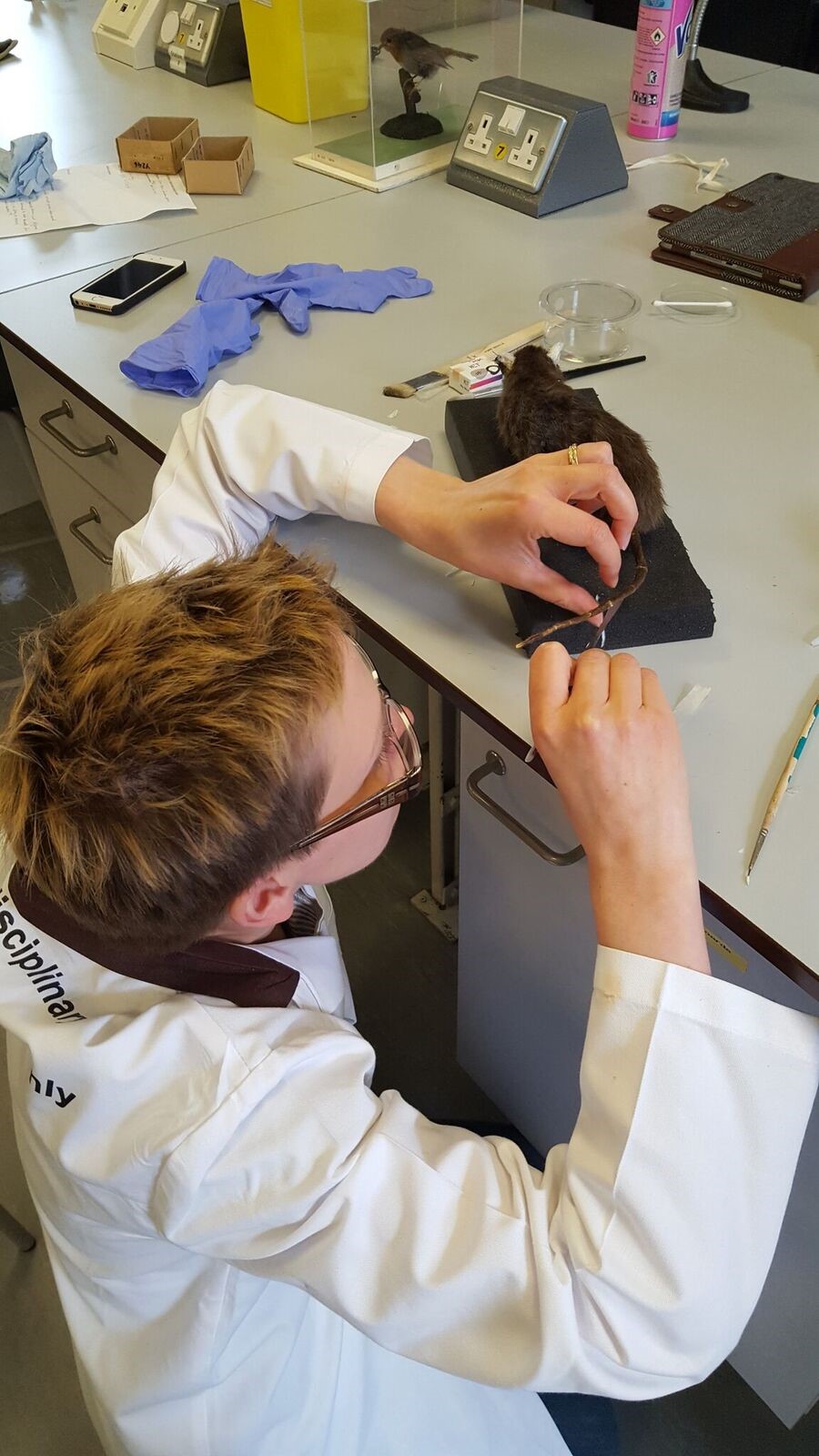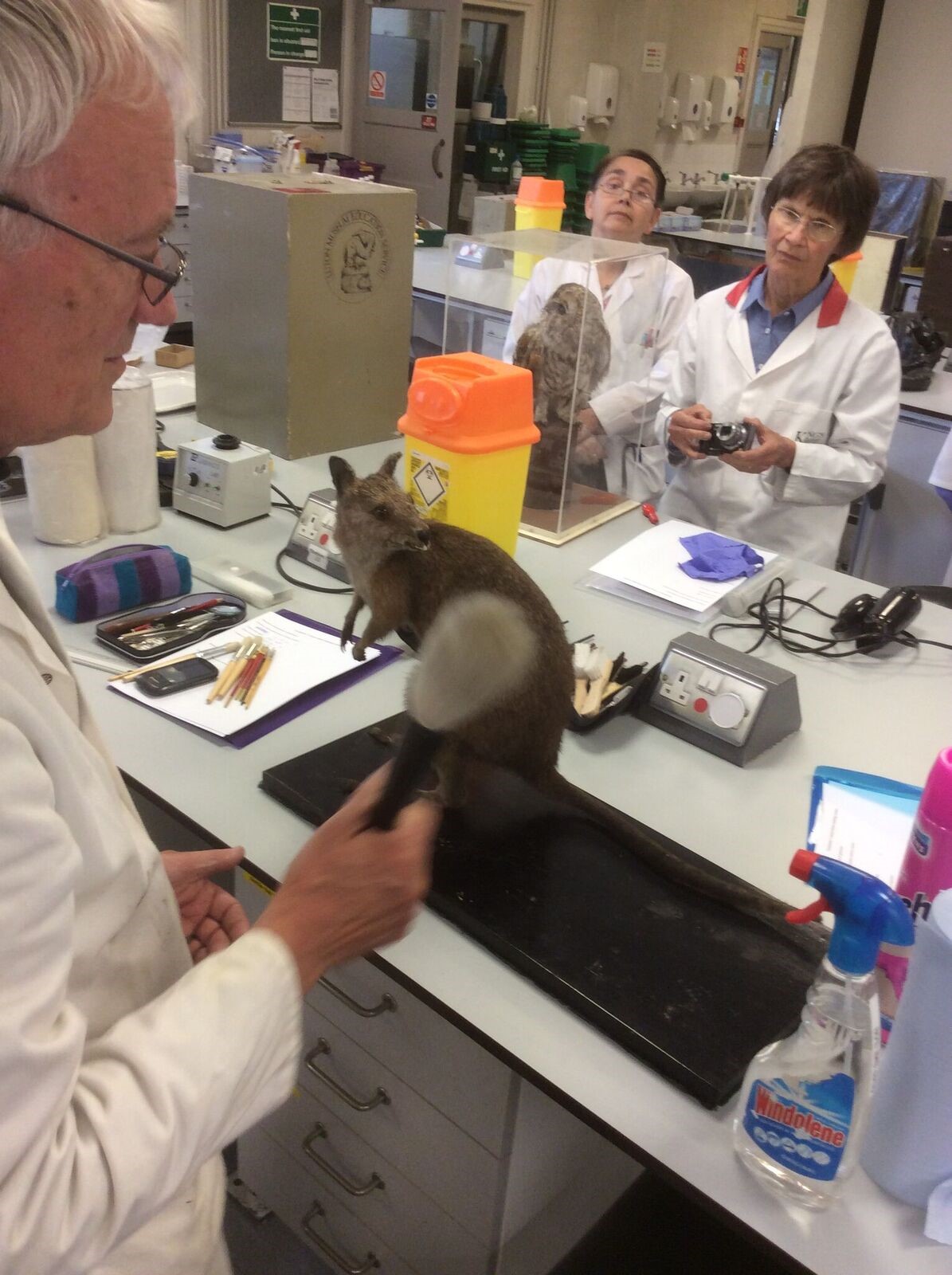



With fifteen participants this three day course took some organising – specimens from several museums including some from King’s own Gordon Museum, were conserved, some with a little restoration, over 3 days. Simon Moore was the trainer and the participants comprised several museum conservators, curators of taxidermy, two taxidermists and a few polymath conservators. The course was the first of its kind, derived from course that Simon used to teach at Camberwell Art College. Overall the course was a great success and much enjoyed by the participants who learned all about re-feathering birds, uses of several types of Japanese tissue, how to partially rehydrate dried areas of skin, horn and claw and many other techniques. Other courses will be run in the future but please contact Simon Moore if you are interested in attending: Couteaufin@btinternet.com




When: From the 16th to 18th of May, 2016.
Course tutor: Simon Moore MIScT, FLS, RScI, ACR, Conservator of Natural Sciences.
Cost: £300.
Where: Kings College, London, Faculty of Life Sciences & Medicine, MDL Teaching Lab B, 3rd Floor, Hodgkin Building, Guys Campus, London, SE1 1UL.
Schedule:
Day 1: 10.00 start.
Introductions, local logistics, fire-exits, risks, allergies (please advise Simon Moore prior to course), loos and house Health & Safety rules.
Power-point of course outlines, problems &c – this will outline the course, some of the problems you are likely to encounter.
Introduction to projects – the idea is that each student should tackle as wide as possible the different techniques involved rather than just settle on one particular specimen/problem.
Look at pest damage as this is the most usual (pests are introduced during the PowerPoint presentation).
How to prevent pest damage – basic Integrated Pest Management (IPM).
Ethics of Conservation vs. Restoration – how far should one go?
Other deteriorative mechanisms – humidity, temperature fluctuation will also be mentioned, along with fading.
How to manage these problems and remedy the resultant damage.
Practical sessions begin:
Practical – select suitable specimen for treatment/s.
Tea/coffee break at agreeable time.
Lunch (1 hour) is not provided and you are advised to make own arrangements.
Afternoon continue with practical work until c. 17.00
Likely projects:
Cleaning fur and feather. Replacing unsuitable/missing glass eyes. Dressing/rehydrating dried areas of skin and other keratins, including claws, beaks. Treating rusted armatures. Dealing with fat-burnt areas. Dealing with pest-damaged areas. Transplanting fur swatches. Straightening bent feathers, repairing broken/damaged feathers. Replacing damaged armature parts.
Cases (if available) and you are permitted to bring your own (not too large please!). Opening cases that are sealed with tapes and/or framing beads. Repairing case backs that have shrunk and split.
Discussion on pest fumigants.
Day 2: 09.15 start
Practical sessions, continue working in more advanced problems once the student has required the basic knowledge and skills.
Day 3: 09.15 start
Practical sessions continue leading to a completion of each project.
Brief verbal assessment of how students have coped with the course (time permitting).
Please bring with you if possible: lab coat, small hair-dryer, dissection instruments (including an old toothbrush) and artist paintbrushes. These will be provided for use but if you can bring some it will be most helpful.
Directions: London Bridge is the nearest Underground & Network Rail Station (about 5 minutes’ walk). King's College, London, is opposite Guy's Hospital and Hodgkin Building is on the far Right Hand Side of the Memorial Arch, as viewed from the Black & White-tiled 'Colonnade' accessed from St Thomas' Street. Hodgkin Building is the furthest from the Colonnade, next to Henriette Raphael Building, and the lab ("Hodgkin Lab B") is on the 3rd floor a few steps up, opposite the 3rd floor lift entrance.

For more details about what we can do for you, or for a quote, please contact:
enquiries@natural-history-conservation.com
We are members of the United Kingdom Institute for Conservation of Historic and Artistic Works